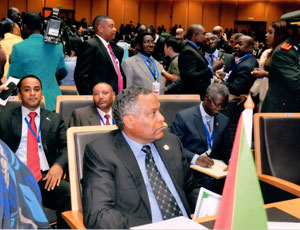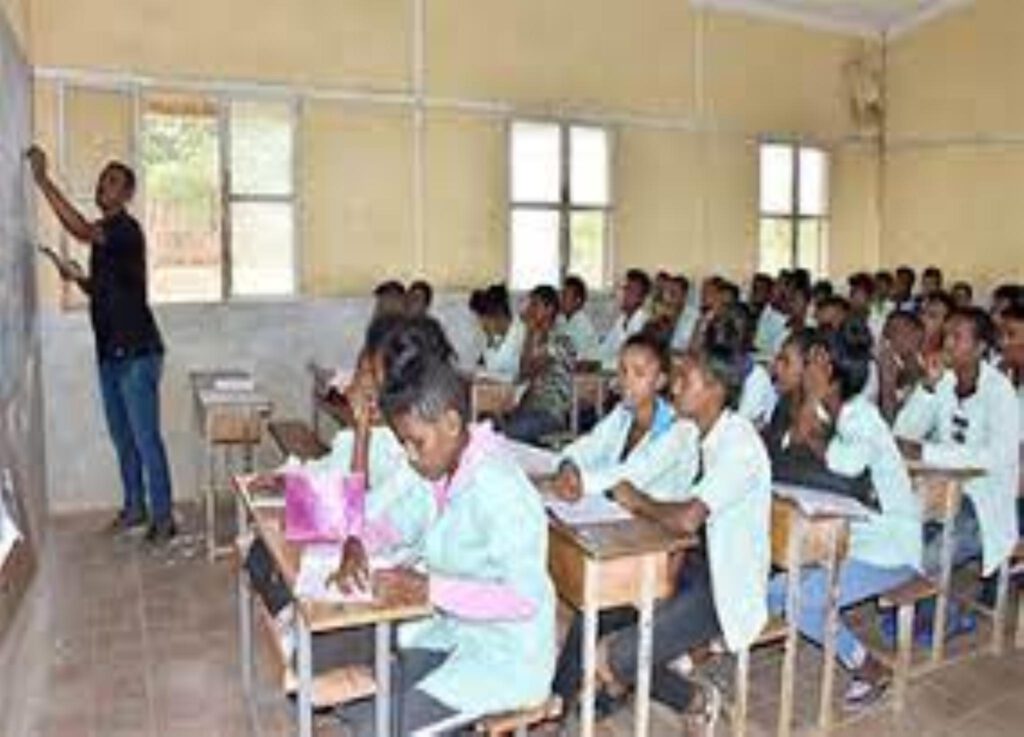January 29, 2013
Statement by H.E Ambassador Girma Asmerom, at the African Union Summit, 28 January 2013, Addis Ababa, Ethiopia

H.E Ambassador Girma Asmerom at the African Union Summit, 28 January 2013, Addis Ababa, Ethiopia
Mr. Chairman, thank you for giving me the floor.
All protocols observed!
The Eritrean Government is deeply concerned with the negative developments in some parts of our continent which are mentioned in the Report of the Peace and Security Council (PSC). However, in the spirit of saving time, I will restrict my intervention to paragraphs 66-74 of the report on Somalia, paragraphs 82-92 on Sudan and South Sudan and paragraph 168 on Eritrea and Ethiopia.
Excellencies,
My first intervention is on paragraph 168 on the situation between Eritrea and Ethiopia.
As you all know, the African Union (AU) is one of the guarantors of the Algiers Agreement between Eritrea and Ethiopia; signed in December 2000 by the President of Eritrea, H.E. Mr. Isaias Afwerki and the late Prime Minister of Ethiopia, H.E. Mr. Meles Zenawi (may his soul rest in peace). By virtue of this, the AU is fully mandated to follow-up whether Eritrea Ethiopia Boundary Commission’s (EEBC) Final and Binding 2002 Delimitation and 2007 Demarcation Decisions are respected and properly implemented. However, for whatever reason, be it political preference or diplomatic nicety, the AU Commission has dedicated only one line in this report to the problem between Eritrea and Ethiopia. The situation between the two countries is very volatile and, if not properly handled, could have serious regional ramifications. More than 300,000 soldiers from both sides are facing each other in the trenches along the border, in some places they are only 500 meters apart.
Excellencies,
The peace process between Eritrea and Ethiopia cannot be characterized as a Deadlock. The dispute has been resolved through Final and Biding arbitration ten years ago. What we have is Ethiopia’s occupation of sovereign Eritrean territory including the town of Badme. There is no political or legal justification for Ethiopia’s non-implementation of the Final and Binding legal arbitration decision, and for it to continue the occupation of sovereign Eritrean territory including the town of Badme. The problem has nothing to do with the issue of “political will” or “dialogue.”
Excellencies,
The legally resolved “border dispute” is lingering because the U.S. Administration’s misguided geopolitical agenda in the Horn of African Region. It has blocked the enforcement of the Final and Binding arbitration Decisions of the EEBC. The misguided U.S. policy is holding peace hostage in Eritrea and Ethiopia, and the Horn of Africa Region as a whole.
To derail and frustrate, if possible also dilute, the legally and conclusively resolved border issue and to prepare the ground for “crisis management,” the U.S. Administration has resorted to futile efforts of bringing up unrelated issues to the matter. As clearly articulated in the U.S diplomatic cables leaked by wikileaks, trumping on the rule of law the U.S is pushing the two parties to go back to “dialogue and the negotiating table”. This is a public relations exercise and as well as political and diplomatic game that is meant to confuse the people of Eritrea and Ethiopia and other peace-loving people and Governments.
Tanzania and Malawi, Niger and Burkina Faso, as well as Sudan and South Sudan who are encountering border disputes are closely watching the implementation of the EEBC Final and Binding Delimitation and Demarcation Decisions. We should be careful not to set a dangerous precedent. It is proper and correct for dialogue to take place before an arbitration decision. However, once the two parties agree to settle their disputes in a Final and Binding arbitration mechanism, the parties must implement the decision unequivocally. The use of political and diplomatic manoeuvre and conditionality, such as calls for “dialogue and bilateral talks”, by the party that is dissatisfied with the arbitration decision must not be accepted and entertained.
The continued occupation of sovereign Eritrean territory by Ethiopia after the Final and Binding Delimitation and Demarcation Decisions of the Eritrea-Ethiopia Boundary Commission (EEBC) in 2002 and 2007, respectively, remains one of the major challenges to peace and stability in the Horn of Africa Region. No nation, big or small, rich or poor, should be allowed to militarily occupy a sovereign territory of another nation. This is a cardinal principle of international law.
Therefore, Eritrea calls up on the African Union, as one of the guarantors of the Algiers Agreement, to urge Ethiopia to withdraw from sovereign Eritrean territory including the town of Badme. This principled action is not only appropriate but will lay the foundation for peace and stability in the Horn of Africa.
It is a puzzle that while in its deliberations and decisions the AU calls for the withdrawal of Israel from occupied Palestinian territory, why it is reluctant to urge Ethiopia to withdraw from sovereign Eritrean territory it is occupying. We should call a spade a spade and hold the bull by its horn!
Excellencies,
I have been instructed by your brother, President Isaias Afwerki to assure you that if Ethiopia withdraws its army from occupied sovereign Eritrean territory including the town of Badme in the morning, dialogue between the two countries will start in the afternoon. We have no other issue with the Ethiopian Government except the military occupation of our sovereign territory. The people of Eritrea and Ethiopia are destined
by Allah/God to live as neighbours. As President Isaias often says “We are not cursed but blessed to be neighbours.” What unites us is more than what divides us.
Excellencies,
Eritrea is not setting a precondition; it is simply requesting that the parties should fulfil their obligations. In accordance with the 2000 Algiers Agreement, Eritrea and Ethiopia are obliged to accept and unconditionally implement the Final and Binding Delimitation Decision of 2002 and Demarcation Decision of 2007 of the EEBC. The EEBC and only the EEBC is the mandated body to delimit and demarcate the border between Eritrea and Ethiopia. Final and Binding, means Final and Binding.
Excellencies,
In conclusion, I urge the AU Commission and the PSC to take a serious look at the Eritrea and Ethiopia problem and to present a clear and elaborate report, i.e. Who is saying what? Who is at fault? to the next Session of the Assembly. The ‘ifs’ and ‘buts’ as well as the “we want dialogue” public relations exercises must be avoided, stopped and exposed. Debate and counter-debate, public relations activities and diplomatic manoeuvres will not bring in peace to the people of Eritrean and Ethiopia.
Excellencies,
My second intervention is on paragraphs 66-74, on Somalia.
The Eritrean Government is strongly committed to Somalia’s sovereignty, territorial integrity, unity and independence; we expect all countries and organizations to show the same commitment. In order to safeguard these sacrosanct principles of international law and pillars of AU Constitutive Act, it is imperative for the Government of President Hasan Sheikh Mahmoud to create conducive environment for an all inclusive peace and reconciliation Conference that allows the participation of all citizens of Somalia and for him to lead the Conference to its final and proper conclusion. The Somali people and only the Somali people must be the owners of their reconciliation agenda. The role of external forces should be providing support for this noble endeavour. Eritrea fully supports Somali owned peace and reconciliation process and effort, and will positively contribute for the success of the process.
Excellencies,
My third, and final, intervention is on paragraphs 82-92, on Sudan and South Sudan.
The current approach of internationalizing the issue between Sudan and South Sudan, rather than bringing about solutions will only complicate the problem further. The long-term interests of the peoples of the two countries should be given prominence over and above any other interest. A holistic approach must be pursued to create an environment for the achievement of a genuine and mutually acceptable solution, as well as to resolve the problem in an effective and sustainable manner. Quick-fixes and unnecessary pressures on the parties should be avoided. Eritrea has long-standing good relations with the Governments and Peoples of Sudan and South Sudan. It is ready, as it has done in the past, to contribute its share for the realization of sustainable peace between the two countries.
Thank you, Mr. Chairman!



